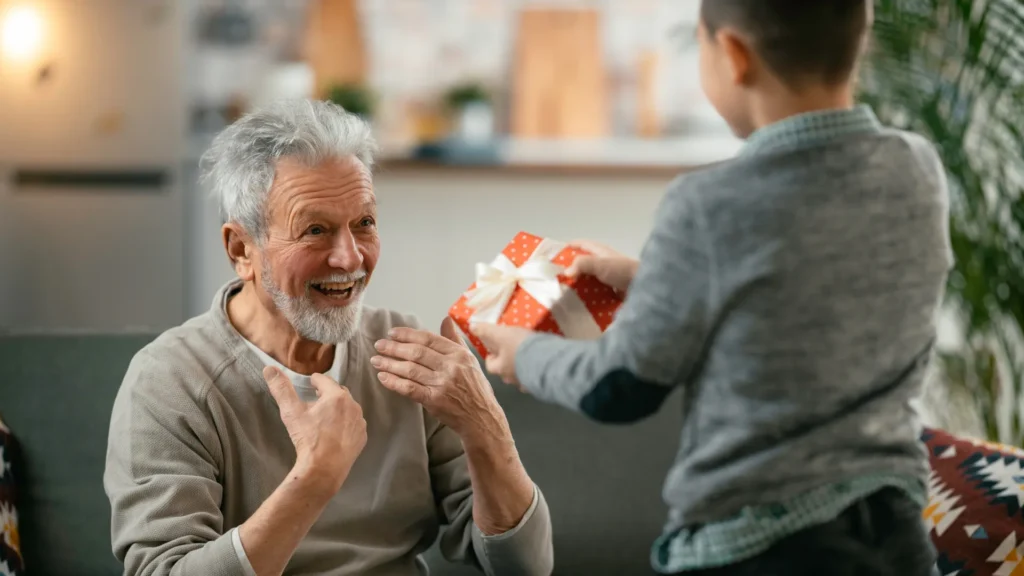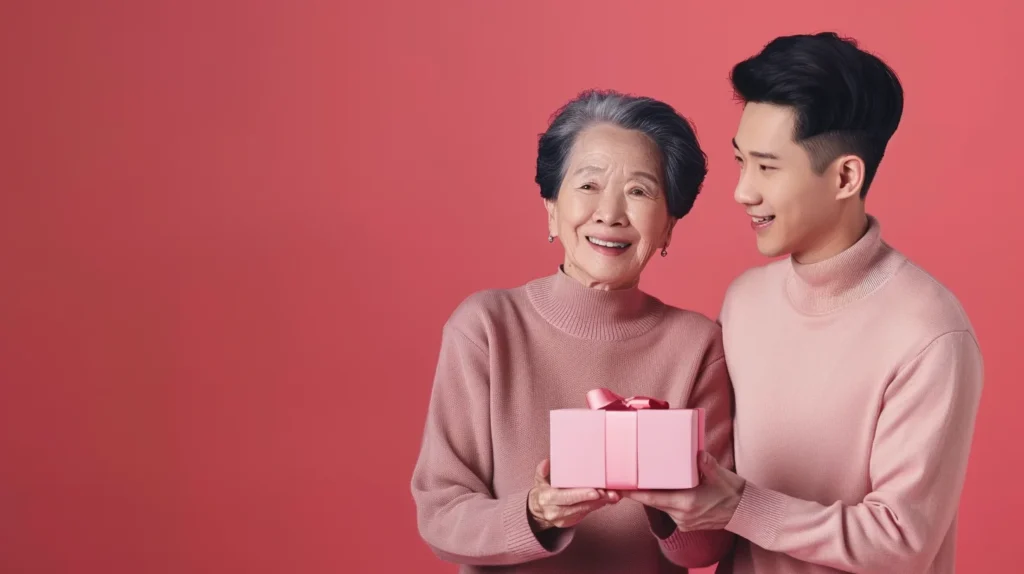Imagine wrapping a gift for someone you love, only to realize they may not remember what it is or who gave it to them. This is the heartbreaking reality for many families with loved ones living with dementia. As the disease progresses, it can become increasingly challenging to find meaningful gifts that bring joy and comfort to those affected. Finding the best gifts for dementia patients however, can make a significant difference.
But what if we told you that the perfect gift is out there? A present that not only brightens their day but also helps them maintain a sense of identity and connection to the world around them. Choosing a gift for someone with dementia requires thoughtfulness, creativity, and an understanding of their unique needs and abilities.
In this article, we will talk about the best gifts for dementia patients. We will offer practical tips and heartfelt ideas to help you navigate this emotional journey. Whether you’re shopping for a parent, grandparent, or friend, our guide will inspire you to find a gift that celebrates their life, their passions, and the love you share.
So, let’s unwrap the possibilities together and discover how a simple gesture can make a world of difference in the life of someone living with dementia.
Factors to Consider When Choosing Gifts

When selecting a gift for a loved one with dementia, it’s essential to keep their unique needs and abilities in mind. Here are some key factors to consider when choosing the best gifts for dementia patients:
Stage of Dementia: The stage of dementia your loved one is in will greatly influence the type of gift that’s most appropriate. In the early stages, they may still enjoy hobbies and activities they’ve always loved. As the disease progresses, simpler and more sensory-based gifts become more suitable.
Individual Preferences: Remember, your loved one is still the same person they’ve always been, with their own unique tastes and interests. Choose gifts for dementia patients that reflect their personality and passions, whether it’s music, art, or a favorite sports team.
Cognitive Abilities: Consider your loved one’s current cognitive abilities when selecting a gift. Puzzles and games that were once enjoyed may now be too challenging, causing frustration instead of joy. Opt for gifts that match their current skills and provide a sense of accomplishment.
Physical Limitations: Dementia can affect a person’s physical abilities, such as dexterity and mobility. Choose gifts that are easy to handle and don’t require fine motor skills. Lightweight and unbreakable items are best to ensure safety and ease of use.
Sensory Stimulation: Gifts that engage the senses can be particularly meaningful for people with dementia. Soft blankets, scented lotions, or a playlist of favorite songs can provide comfort and evoke positive memories.
Emotional Connection: Above all, the best gifts for dementia patients are those that foster an emotional connection. A photo album filled with cherished memories, a beloved book to read together, or a heartfelt letter expressing your love can be more valuable than any store-bought item.
By keeping these factors in mind, you can choose gifts for dementia patients that bring joy, comfort, and a sense of connection to your loved one.
Gift Ideas for Early-Stage Dementia

In the early stages of dementia, your loved one may still enjoy many of the same hobbies and activities they always have. However, it’s important to choose gifts for dementia patients that provide cognitive stimulation, evoke positive memories, and help them maintain a sense of independence. Here are some thoughtful gift ideas for those in the early stages of dementia:
Digital Photo Frames: Photos are a powerful way to reminisce and spark conversations. A digital photo frame allows you to upload a variety of pictures, which can be particularly meaningful as dementia progresses. Involve family members and friends in contributing photos to help your loved one feel connected to their support network.
Music Player or Smart Speaker: Music has been shown to provide emotional and behavioral benefits for people with dementia, such as reducing stress and anxiety. Consider an easy-to-use MP3 player or a smart speaker that allows your loved one to create playlists or request music through voice commands.
Activity Books, Puzzles, or Games: Engaging in mentally stimulating activities can help reduce stress and activate problem-solving areas of the brain. Look for activity books with word games and crossword puzzles, or choose puzzles and memory games that promote coordination, matching skills, and visual perception.
Personalized Photo Albums or Calendars: A thoughtfully curated photo album or calendar featuring cherished family memories can be a meaningful gift. Consider using a talking photo album that allows you to record messages for each page, or create a calendar with photos from your loved one’s favorite travel destinations.
Comfortable Clothing and Blankets: As dementia progresses, many people experience changes in temperature sensitivity. A cozy lap blanket or soft, comfortable clothing can provide a sense of warmth and security. Choose materials that are easy to care for and have simple closures to promote independence in dressing.
When selecting gifts for dementia patients in the early stages, prioritize items that reflect their interests, provide cognitive stimulation, and foster a sense of connection to their loved ones. Remember to involve your loved one in the gift selection process when possible, as this can help ensure the gift is both meaningful and enjoyable for them.
Gift Ideas for Middle-Stage Dementia

As dementia progresses to the middle stage, your loved one may experience more pronounced symptoms that affect their daily life. They might have difficulty expressing thoughts, performing routine tasks, or dressing independently. Gifts for dementia patients that provide comfort, safety, and sensory stimulation can be particularly meaningful during this stage.
Adaptive Clothing: Clothing with easy closures like zippers or velcro can make dressing simpler for your loved one. Look for items like cardigans, elastic-waist pants, and slip-on shoes that promote independence and reduce frustration.
Comforting Blankets or Stuffed Animals: Soft, cozy items can provide a sense of security and warmth. A weighted blanket or a lifelike stuffed animal can offer comfort and companionship, especially during times of anxiety or agitation.
Simple Puzzles or Sorting Activities: Engaging in mentally stimulating activities can help reduce stress and provide a sense of accomplishment. Choose puzzles with large pieces and bright colors, or sorting activities with familiar objects like colored balls or shapes.
Music Player with Favorite Songs: Music has the power to evoke memories and emotions, even in the later stages of dementia. Create a playlist of your loved one’s favorite songs on an easy-to-use music player or load them onto an MP3 player with simple controls.
Sensory Stimulation Items: Products that engage the senses can provide calming and engaging experiences. Consider items like a fiber optic light, a soothing sound machine, or a tactile lap pad with various textures and colors.
Remember, the key is to choose gifts for dementia patients that prioritize comfort, safety, and enjoyment. Involve your loved one in the selection process when possible, and look for items that align with their current abilities and interests.
Gift Ideas for Late-Stage Dementia

In the late stages of dementia, your loved one may have severe cognitive decline and physical limitations. They may be unable to communicate verbally, walk independently, or engage in activities they once enjoyed. Gifts for dementia patients at this stage should focus on providing comfort, sensory stimulation, and a sense of security.
Lifelike Stuffed Animals or Dolls: Realistic stuffed animals or baby dolls can provide a sense of companionship and comfort. They can also encourage nurturing instincts and provide a soothing tactile experience. Look for soft, lightweight options that are easy to hold and cuddle.
Sensory Blankets or Pillows: Soft, textured blankets or pillows can offer comfort and sensory stimulation. Consider items with different textures, such as faux fur, velvet, or satin. Weighted blankets can also provide a calming, grounding effect for some individuals.
Soothing Music or Sound Machines: Gentle, familiar music or nature sounds can be calming and reassuring. Choose music from your loved one’s favorite genre or era, or opt for a sound machine with nature sounds like ocean waves or birdsong.
Simple Picture Books: Books with large, colorful images and minimal text can provide visual stimulation and encourage reminiscence. Look for themes that match your loved one’s interests, such as nature, animals, or family photos.
Comfortable Clothing: Soft, easy-to-wear clothing can provide comfort and ease dressing challenges. Look for items with simple closures like zippers or snaps, and avoid tight or restrictive garments. Prioritize comfort over style at this stage.
Remember, the most important gift you can give your loved one in late-stage dementia is your presence, love, and support. Even if they cannot express it, your companionship and care can make a significant difference in their quality of life. When choosing gifts for dementia patients, focus on items that provide comfort, sensory stimulation, and a sense of security.
Personalized and Sentimental Gifts

Personalized and sentimental gifts can be particularly meaningful for individuals with dementia. These gifts celebrate the person’s life, memories, and relationships, providing a sense of connection and comfort. Here are some ideas for gifts for dementia patients that are personalized and sentimental:
Custom Photo Blankets: A cozy blanket featuring cherished family photos can provide both physical and emotional warmth. Look for options that allow you to create a collage of images or add text for a truly personalized touch.
Engraved Jewelry or Keepsakes: A piece of jewelry or a keepsake, such as a locket or a keychain, engraved with a special message or date can serve as a tangible reminder of your love and support. Choose items that are safe and easy to wear or handle.
Memory Boxes: Create a collection of mementos that hold special meaning for your loved one. Fill a decorative box with items like old letters, postcards, tickets, or small trinkets that evoke happy memories. Include a brief note or label to provide context for each item.
Recordings of Family Stories: Record family members sharing favorite stories, anecdotes, or messages of love. Load these recordings onto an easy-to-use device, such as an MP3 player or a simple digital photo frame with audio capabilities.
Personalized Photo Albums or Calendars: Compile a photo album or calendar featuring images of family, friends, and special moments throughout your loved one’s life. Add captions or short stories to provide context and trigger memories. Choose albums or calendars with large, clear images and simple layouts.
Remember, the most cherished gifts for dementia patients are often those that come from the heart. Taking the time to create something personalized and meaningful shows your love and dedication to your loved one with dementia.
Show Your Love

Choosing a gift for a loved one with dementia can be challenging, but it’s an opportunity to show your love and support in a tangible way. Whether your loved one is in the early, middle, or late stages of dementia, there are gifts that can provide comfort, stimulation, and joy.
Remember to consider your loved one’s unique interests, abilities, and needs when selecting a gift. Personalized and sentimental items can be especially meaningful, as they celebrate the person’s life and relationships.
The most important gift you can give is your presence and love. Spending quality time together, sharing stories, and creating new memories are priceless gifts that will make a difference in your loved one’s life.
So, take action today. Choose a gift that reflects your love and understanding of your loved one with dementia. Whether it’s a cozy blanket, a favorite music playlist, or a custom photo album, your thoughtfulness will be appreciated more than you know.
If you’re still unsure about what to give, don’t hesitate to reach out to other family members, friends, or caregivers for ideas. Together, you can find the perfect gift to brighten your loved one’s day and show them how much they are loved and cherished.
Today we talked about the best gifts for dementia patients. Here are some other articles you might be interested in:
What are the Best Cereal for Weight Gain?
Boost your Protein Intake with Fairlife Protein Shakes
What are the Best Cereal for Weight Loss?
Best Postpartum Collagen for Recovery
Best Antihistamine Eye Drops Tested for 2024
What is a Postpartum Pain Relief Spray?



